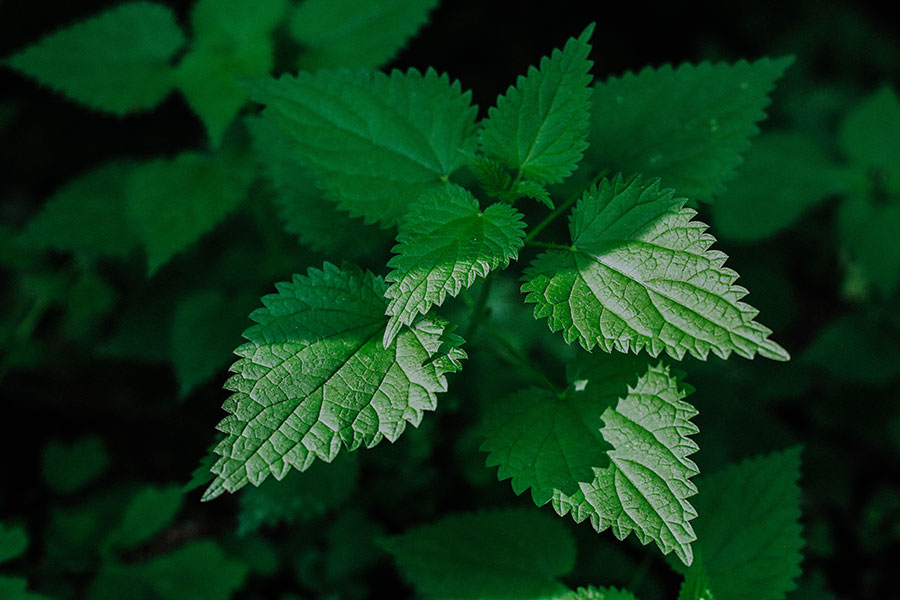Lavender
Scientific Name: Lavandula angustifolia
Benefits: Promotes relaxation, reduces anxiety, improves sleep quality, and uplifts mood.
Uses: Aromatherapy, tea, sleep sachets, sensory grounding.
Usage Details:
- Aromatherapy: Gently rub the flowers to release their essential oils and place near the bed or in a calming corner.
- Tea: Steep 1 tsp of dried flowers in hot water for 5–7 minutes. Sip slowly before bedtime.
- Sleep Sachets: Fill a small cloth bag with dried lavender and place it under the pillow to promote restful sleep.
- Sensory Activity: Invite participants to harvest flowers, then roll them between fingers while focusing on scent and touch to ground the senses.
Rosemary
Scientific Name: Rosmarinus officinalis
Benefits: Boosts memory, sharpens focus, reduces mental fatigue, stimulates circulation.
Uses: Culinary herb, memory-enhancing scent, infused oils, grounding garden tasks.
Usage Details:
- Cognitive Support: Crush fresh rosemary and inhale deeply for clarity before starting a task.
- Cooking Therapy: Add to bread dough, roasted vegetables, or soups.
- Oil Infusion: Steep sprigs in olive oil for 2–3 weeks and use the infused oil as a hand rub during mindfulness practice.
- Garden Activity: Pruning or shaping rosemary is great for focus and motor coordination.
Mint
Scientific Name: Mentha spp.
Benefits: Uplifts mood, improves digestion, refreshes the mind and body, supports focus.
Uses: Tea, compresses, sensory exploration, garnish for therapeutic cooking.
Usage Details:
- Tea: Use 5–6 fresh leaves or 1 tsp dried in a cup of hot water. Steep for 5 minutes.
- Cooling Compress: Crush mint and add to cool water. Soak a cloth and apply to the neck or forehead.
- Mindfulness Practice: Rub a leaf, inhale deeply, and describe the scent and memory it brings.
- Garden Engagement: Encourage harvesting or transplanting mint as a soothing activity.
Chamomile
Scientific Name: Matricaria chamomilla
Benefits: Calms the nervous system, improves sleep, reduces stress, aids digestion.
Uses: Tea, compresses, flower-picking therapy, mindfulness rituals.
Usage Details:
- Tea: Steep 1–2 tsp dried flowers in hot water for 10 minutes. Drink before bed or after a stressful session.
- Compress: Soak a clean cloth in cooled tea and apply to eyes or hands.
- Flower Harvesting: Invite participants to pick flowers gently and arrange them in small bowls to engage senses and motor skills.
Aloe Vera
Scientific Name: Aloe barbadensis
Benefits: Soothes skin, promotes wound healing, reduces inflammation, hydrates.
Uses: Topical gel, skin therapy, indoor plant care, sensory exploration.
Usage Details:
- Topical Use: Cut an outer leaf, extract the clear gel, and apply directly to minor burns or dry skin.
- Indoor Care: Great for potting and watering activities—builds confidence and responsibility.
- Texture Exploration: Have participants feel and describe the cool, jelly-like substance as a grounding activity.
Lemon Balm
Scientific Name: Melissa officinalis
Benefits: Relieves stress, boosts mood, calms anxiety, gently stimulates the mind.
Uses: Tea, scent therapy, calming activities, indoor/outdoor plant care.
Usage Details:
- Tea: Steep 6–8 leaves in hot water for 5 minutes.
- Scent Therapy: Crush a fresh leaf and inhale deeply—ideal for calming anxious minds.
- Plant Nurturing: Keep in a pot or therapy garden. Participants can care for it daily as a mood-boosting task.
Basil
Scientific Name: Ocimum basilicum
Benefits: Boosts mental clarity, improves digestion, promotes a sense of calm and well-being.
Uses: Culinary herb, tea, sensory harvesting, therapeutic cooking.
Usage Details:
- Tea: Steep 4–6 fresh leaves in hot water for 5 minutes to create a focus-enhancing brew.
- Cooking: Use in pasta, salads, or soups to stimulate appetite and sensory awareness.
- Harvesting Task: Pinch leaves from the top of the plant – encourages mindfulness and connection to growth cycles.
Thyme
Scientific Name: Thymus vulgaris
Benefits: It supports respiratory health, promotes mental clarity, antibacterial, and mood balancing.
Uses: Tea, sensory walks, memory planting, culinary engagement.
Usage Details:
- Tea: Boil 1 tsp dried thyme in water and let steep 10 minutes—great for clearing sinuses.
- Sensory Walk: Brush hands across the plant and take a deep breath—helps focus attention.
- Memory Garden: Plant as a symbolic herb to honor healing journeys or special memories.








